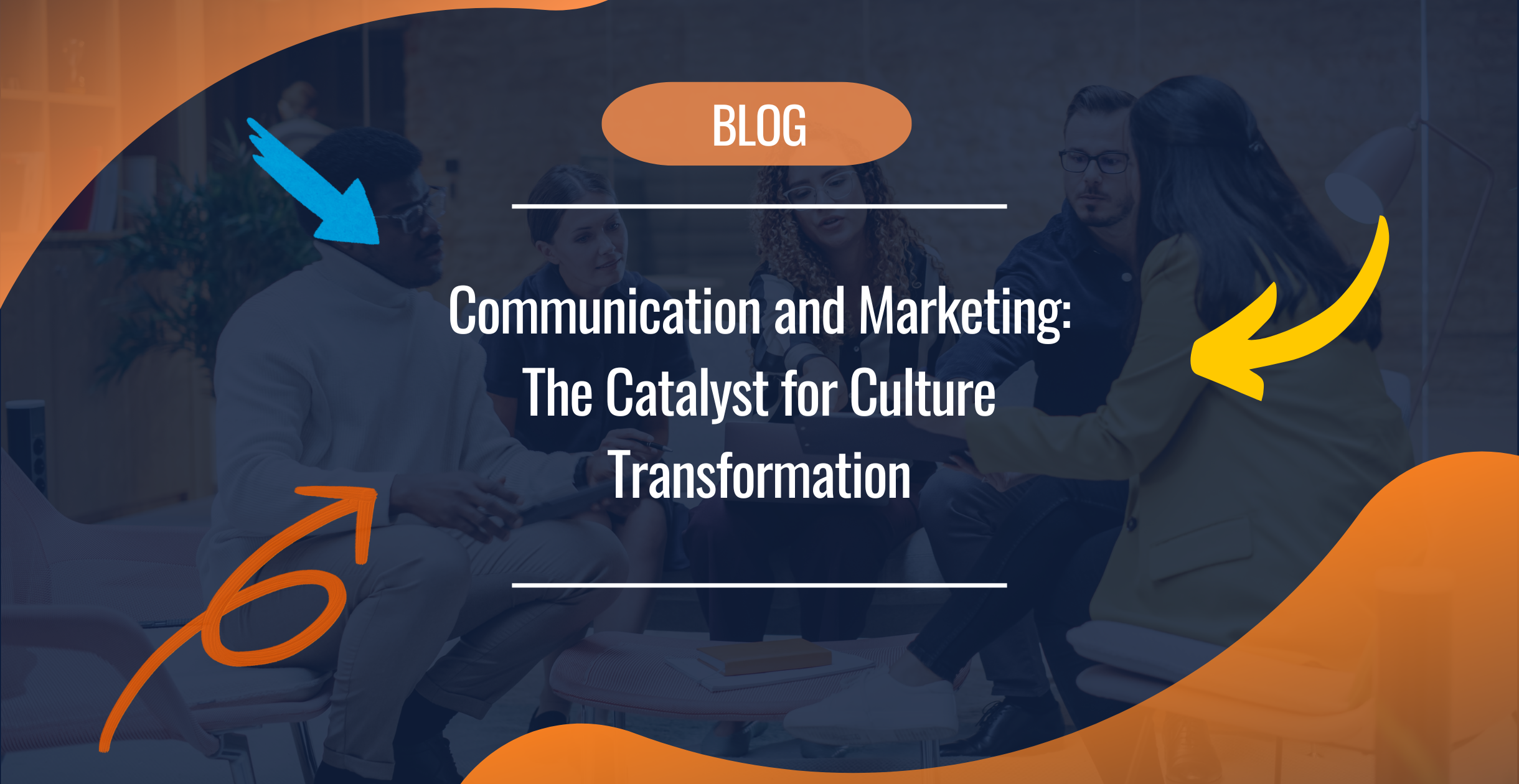Culture transformation is essential for organizations looking to stay competitive, attract top talent, and align with the diverse values of today’s workforce. However, this process isn’t merely about internal changes—it requires effective communication and strategic marketing to ensure employees and external stakeholders understand and embrace the transformation. The success of culture transformation hinges on these elements, ensuring that every participant is aware of the changes and understands and embraces them. This blog explores the importance of communication and marketing in culture transformation, how they contribute to a successful shift, and how a consulting company can guide organizations through this journey.
Why Communication and Marketing are Vital for Culture Transformation
- Building Awareness and Understanding
Effective communication is the cornerstone of any successful culture transformation. It’s essential to convey the reasons behind the transformation, the organization’s vision, and the anticipated outcomes to all employees. When employees understand why change is necessary, they are more likely to engage with the process and contribute positively. This is an example of inclusion. Clear and consistent messaging helps demystify the transformation process, reducing the uncertainty and resistance often accompanying significant change. Transparency in any process builds trust and fosters buy-in. Remember, clear is kind.
Marketing, on the other hand, goes beyond internal communication. It’s about positioning the transformation externally, ensuring clients, partners, and other stakeholders know the organization’s new direction. This can be especially important when a culture shift aligns with broader societal trends, such as a commitment to sustainability or a focus on diversity, equity, and inclusion (DEI). Organizations can attract like-minded partners and customers who share their values by effectively marketing these changes.
- Enhancing Employee Engagement and Inclusion
A well-executed communication strategy fosters a culture of transparency and trust, which is essential for employee engagement. Employees are more likely to feel included in the culture transformation when they receive regular updates, have opportunities for feedback, and see that their input is valued.
“This is where communication intersects with employee engagement, turning a top-down directive into a collaborative effort that builds morale and enthusiasm.”
Additionally, marketing plays a role in reinforcing these messages through campaigns that celebrate milestones and highlight success stories within the organization. It can create a narrative that shows how the culture transformation is progressing, spotlighting employees who embody the new values and behaviors. This storytelling aspect is critical in transforming feel real and attainable, rather than just a set of abstract ideals.
- Aligning Brand Identity with New Values
As organizations undergo culture transformation, their external identity must evolve in tandem. This involves updating the brand’s messaging, visuals, and overall tone to reflect the new culture. For example, if an organization is shifting towards a more collaborative and innovative culture, its external communications should emphasize these aspects through its website, social media, and marketing materials.
This alignment between internal values and external branding ensures the company presents a consistent image to the world. It helps attract talent that resonates with the new culture and retains clients who appreciate the organization’s commitment to progress. A cohesive communication and marketing strategy ensures that all stakeholders understand and experience the brand’s transformation. These intentional approaches reflect the organization’s dedication to fostering unity and commitment, ensuring that every member is aligned and moving in the same direction.
How Communication and Marketing Drive Successful Culture Transformation
- Facilitating Change Management
Culture transformation is, at its core, a change management initiative. And for any change to be successful, it must be managed effectively. Communication plays a critical role in this process by clarifying new expectations, timelines, and the support available to employees during the transition. Marketing complements this by creating momentum through internal campaigns that inspire and motivate.
When done right, communication and marketing can turn passive acceptance of change into active support. By continually reinforcing the transformation message, sharing stories of progress, and celebrating wins, organizations can maintain the energy and enthusiasm needed to see the transformation through to completion.
- Reducing Resistance to Change
One of the biggest challenges in culture transformation is addressing resistance from employees who feel at ease with existing practices and routines. Communication is essential for addressing fears and misconceptions. It allows leaders to explain the long-term benefits of the change, acknowledge the challenges, and provide a platform for employees to voice their concerns. This transparency reduces the anxiety that often accompanies change, making it easier for employees to embrace new working methods.
Marketing, mainly internal marketing, can also be leveraged to reduce resistance. By creating campaigns highlighting the new culture’s positive aspects, such as increased collaboration or a renewed focus on innovation, organizations can shift the narrative from “why we have to change” to “how we’re growing together.” This shift in perspective can be a powerful motivator for employees to participate actively in the transformation process.
- Creating a Culture of Continuous Improvement
Effective communication and marketing help embed an organization’s continuous improvement culture. When leaders regularly communicate about the progress of the transformation, share data on the impact of new initiatives, and celebrate early successes, it creates an environment where employees feel encouraged to keep striving for improvement.
Marketing campaigns focusing on the journey rather than the destination can reinforce this mindset. They can highlight stories of incremental progress, showcase teams adapting well, and emphasize that culture transformation is an ongoing process. This helps prevent stagnation and ensures the new culture remains vibrant and dynamic.
How a Consulting Company Can Help with Communication and Marketing in Culture Transformation
- Developing a Strategic Communication Plan
Consulting companies specializing in organizational transformation can bring valuable expertise by helping develop a strategic communication plan. This plan would outline critical messages, target audiences, communication channels, and timelines to ensure that every aspect of the transformation is effectively communicated. Consultants can provide guidance on crafting messages that resonate with different employee segments and suggest best practices for managing difficult conversations about change.
Additionally, they can help design training programs for leaders to improve their communication skills, ensuring managers can effectively convey the organization’s vision and answer questions about the transformation. This leadership alignment is critical to ensuring that communication efforts are consistent and trustworthy.
Consulting firms can help create tailored employee engagement initiatives to foster buy-in throughout the transformation process. They can design campaigns highlighting the benefits of change, incorporate feedback loops to ensure employees feel heard and develop recognition programs to celebrate progress. This creates a sense of ownership and accountability among employees, transforming feel inclusive and collaborative.
- Crafting Marketing Campaigns Aligned with the New Culture
Marketing is as much about storytelling as it is about strategy. A consulting company can help organizations develop marketing campaigns aligning with their new cultural values, ensuring that the transformation is visible internally and externally. This could include creating content for social media, updating website messaging, or even designing internal newsletters that keep employees informed and engaged.
Consultants can also advise how to market the transformation to external stakeholders, such as customers, partners, and investors. By helping organizations articulate the benefits of their cultural shift, consulting firms can ensure that the transformation is seen as a value-driven change that enhances the brand’s reputation.
- Measuring the Impact of Communication and Marketing Efforts
One of the advantages of working with a consulting company is their ability to measure the impact of communication and marketing efforts. They can help organizations track employee engagement levels, feedback from internal surveys, and the reach and effectiveness of marketing campaigns. These metrics provide valuable insights into what’s working and needs adjustment, allowing organizations to refine their strategies as the transformation progresses.
This data-driven approach helps ensure that resources are used effectively and that the transformation moves in the right direction. It also provides a way to celebrate milestones and showcase the tangible progress of the culture transformation, both internally and to the broader market.
In culture transformation, communication and marketing are more than just support functions—they are essential drivers of change. They build understanding, drive engagement, align brand identity, and create a culture of continuous improvement. Organizations that leverage these tools effectively can achieve a successful culture transformation that resonates with internal and external stakeholders. By partnering with a consulting company, businesses can develop a strategic approach to communication and marketing that ensures a smooth, inclusive, and impactful transition, setting the stage for long-term success.







